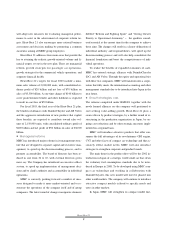Mitsubishi 2000 Annual Report Download - page 21
Download and view the complete annual report
Please find page 21 of the 2000 Mitsubishi annual report below. You can navigate through the pages in the report by either clicking on the pages listed below, or by using the keyword search tool below to find specific information within the annual report.
Category of expenditure Unit: ¥m
1. Direct expenditures on reducing environmental impact (direct environmental costs) 4,118
(1) Pollution prevention 2,299
(2) Global environmental protection 109
(3) Disposal and recycling of industrial waste and ordinary business waste 1,710
2.
Environmental costs arising from use and disposal of products produced and sold, etc
83
3.
Indirect expenditures on reducing environmental impact (administrative environmental costs)
1,068
4. Expenditure on R&D to reduce environmental impact (environmental R&D costs) 32,342
5.
Expenditures on community and social activities related to reducing environmental impact
(environment-related community action costs)
335
6. Other environment-related costs 55
Total 38.001
19
Environmental stewardship & technology
19
Environmental management
The Mitsubishi Environmental Plan, drawn up in March
1993, laid down the philosophy governing the company's ap-
proach to environmental issues. This was replaced in August
1999 by the MMC Environmental Guidelines, which also ad-
dress the latest issues in laying down basic environmental
stewardship policy for MMC group member companies.
These guidelines affirm that conservation of the global
environment is the most important issue facing humankind
today, and commit MMC to work toward environmental pro-
tection in all areas of its business and at every stage in the
lifecycle of its products. The behavioral standards set forth in
the guidelines prioritize action to combat global warming
and pollution, and to promote recycling. The Company re-
cently established the Environmental Council, chaired by
company president Katsuhiko Kawasoe and comprising four
committees, to direct and oversee conservation efforts.
The Product Committee directs efforts at the R&D stage
toward improving fuel economy and reducing emissions. The
Production Committee oversees efforts directed toward pre-
serving the local environment at production facilities. The
Recycling Committee is responsible for promoting designing
in of better recyclability in new models, the appropriate dis-
posal of end-of-life vehicles (ELV's) and other post-produc-
tion issues. The Truck & Bus Committee oversees environ-
mental aspects of the Company's commercial vehicle opera-
tions
The Environmental Affairs Department has special re-
sponsibility for environmental matters. Established to further
increase the scope and quality of the company's environmen-
tal activities, the department sets the direction of environ-
mental policy for the MMC group of companies, as well as
serving as the secretariat for the Environmental Council and
its committees.
Environmental accounting
MMC believes that the keeping of accurate records of expen-
diture on, and assessing the relative effectiveness of, mea-
sures taken are vital to its efforts to maintain on-going and
effective environmental activities. Toward this end, the
Company has introduced environmental accounting to boost
the cost-effectiveness of its environmental stewardship.
■Total environmental costs in fiscal 1999
April 1, 1999~March 31, 2000
Environmental conservation benefits
Category
1. In-plant benefits
Environmental load index
Item FY1999
Change over
FY1998
●Energy use in production process
(CO2 emissions)
●In-plant waste disposal
167,000 t-C
8,000 t
- 2.3%
- 27.3%
2.
Up- and downstream benefits
●Used bumpers recovered 61,600 + 19.4%
3. Other benefits ●
Average fuel consumption by vehicle
weight category (gasoline fuelled cars)
(1) Category 1 (up to 875kg)
(2) Category 2 (1000 - 1500 kg)
(3) Category 3 (over 1750 kg)
18.9 km/l
14.3 km/l
10.3 km/l
+ 2.7%
+ 0.7%
- 3.7%
























